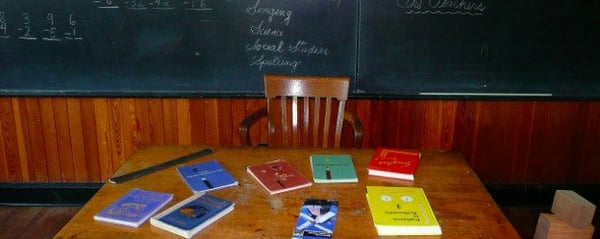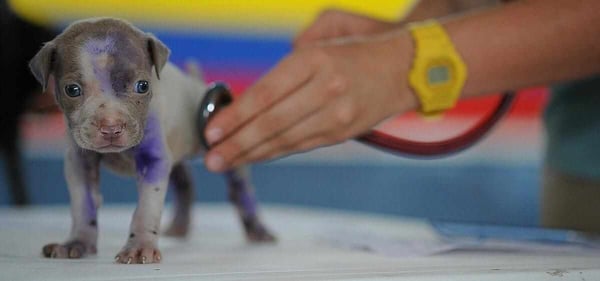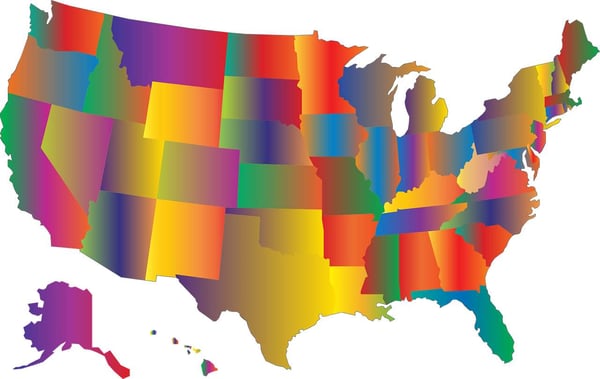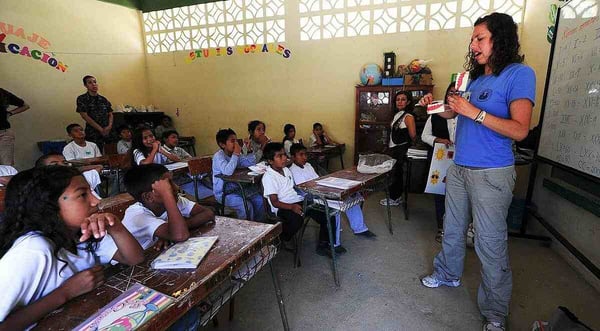The Ultimate List of Grants to Pay Off Student Loans
Dying for student loan debt relief? Sure, you can put those loans in deferment or forbearance, but both of those options have major drawbacks.
It’s way better just to get your loan forgiven or have someone else pay it off for you. And if you're interested in that (because who isn't?), you've come to the right place. Get ready—this is the largest guide to student loan debt relief we've ever assembled.
What is student loan forgiveness?
Student loan forgiveness can come in many different forms. You could receive a grant to pay off some or all of your loans, or you could get your loans cancelled in exchange for working in a specific high-needs area for a period of time.
For instance, one of the most well-known student loan forgiveness programs is Public Service Loan Forgiveness. Under this program, the government will cancel your federal loans if you work for a qualifying employer in public service and make 120 qualifying payments.
We go into that program in later in this article, but for now, know that it's not the only way to get your loans forgiven.
Can you get a grant to pay off student loans?
Absolutely! There are many ways to have your student loans forgiven. Many of these are tied to your profession and where you work, but you can also find grants through your employer, organizations you’re involved with, volunteer opportunities, and more.
Most student loan forgiveness programs fall under the following categories, which we will cover in-depth below:
- Career-based student loan forgiveness
- Federal student loan forgiveness
- State-based student loan forgiveness
- Military student loan forgiveness
- Nonprofit/volunteer student loan forgiveness
- Forgiveness programs administered by corporate employers for employees
We've provided links to the original websites for all the grant programs we list below, so you can easily see how and where to apply.
If the application period has passed on one that looks good to you, try setting a calendar reminder to check back when it starts up again. This is a good idea, because many are given out on a yearly basis — and for some, the funds are first-come, first-served. Plus, many of these programs run annually.
Career-based grants
These are grant programs that provide funds on a national level to anyone in these fields who qualify.

Grants for doctors, nurses, and other healthcare professionals
National Health Service Corps: This is one of the most commonly-known grant programs for people in the medical field, including doctors, dentists, and mental health professionals.
The deal is simple: sign up for two years of full-time work within a high-needs community, and get up to $50,000 off your student loans. Reimbursement for part-time work is also possible. See the funding levels here.
Nurse Corps Loan Repayment Program: There are many state-based grants to pay off student loans for nurses; this is the main one at the national level. (It's also a great source for finding funding for specialized areas within nursing.)
The program will pay off 60% of student loan debt for registered nurses who work at least two years in a critical shortage area. Those who opt to work an optional third year may receive an additional 25% in reimbursement.
IHS Loan Repayment Program: This program will repay up to $40,000 of your qualifying student loans if you sign up for two years of service in American Indian and Alaska Native communities.
If you choose to stay longer, you could keep renewing your contract until your entire physician student loan debt is paid.
Students-to-Service Loan Repayment Program: If you’re in your final year of medical or dental school, you could earn up to $120,000 in student loan repayment by agreeing to work in an area with a shortage of medical professionals for three years after you graduate.
See also: Student Loan Forgiveness for Doctors and Medical Professionals
Grants for teachers

Teacher Loan Forgiveness Program: You could earn up to $17,500 in forgiveness for your federal Direct Subsidized and Unsubsidized Loans (including Stafford loans) if you agree to teach for five years in a low-income area.
Teacher Cancellation of Perkins Loans: There are no new Perkins loans as of 2017. But if you have one from before then, you could get the full amount forgiven if you qualify.
Qualifying teachers work in low-income communities or teach high-needs subjects like math, special education, science, bilingual education, or foreign languages.
This program is noteworthy because unlike other grants to pay off student loans for teachers, it doesn’t have a set time requirement or even a specific number of hours per week you need to work. You get your forgiveness in per-year percentage increments until the loan is forgiven.
See also: Student Loan Forgiveness for Teachers
Grants for veterinarians

Veterinarian Medical Loan Repayment Program: This program pays as much as $25,000 per year toward your veterinarian school debt if you agree to work in an area with a shortage of veterinarians for three years.
Grants for lawyers

John R. Justice Student Loan Repayment Program: This program is designed for public defenders and state prosecutors. You can get up to $10,000 per year ($60,000 in total) toward your law school loans if you agree to three to six years of service.
You can apply through your state.
Department of Justice Attorney Student Loan Repayment Program: This program provides about $6,000 per year, up to $60,000 in total, for attorneys who work in the Department of Justice and have federal student loan debt totaling least $10,000. There is a three-year service obligation. Applicants are selected on a competitive basis.
Herbert S. Garten Loan Repayment Assistance Program: This program operates on a lottery system, offering as much as $5,600 in grants to attorneys with at least $75,000 in student debt. You have to work with one of the organization’s grantees to qualify.
Other options: Many law schools offer loan forgiveness for graduates who work in the public sector, and there are numerous state-based programs for public-service lawyers as well. Check out the American Bar Association website for a more complete list of resources.
Grants for researchers

National Institutes of Health (NIH) Loan Repayment Programs: This is actually a group of grant programs designed to entice medical professionals into key research fields. You can get up to $50,000 per year (for a total of two years) by agreeing to conduct research considered critical by the NIH. You don’t have to work for the NIH to qualify.
The individual research topics include:
- Clinical research
- Pediatrics
- Health disparities in minority populations
- Contraception and infertility
- Clinical research for individuals from disadvantaged backgrounds
Federal student loan forgiveness
The federal government administers many of the career-based forgiveness programs we’ve mentioned already, but the following are either not tied to your job title or apply to a wide range of professions.
Public Service Loan Forgiveness (PSLF): We’ve written a lot about this program. The upshot is that you can get the remainder of your federal student loans forgiven after 10 years or 120 qualifying payments, if you work for a qualifying government or nonprofit employer.
Under this program, there are a lot of hoops to jump through. It matters more who you work for than your job title; doctors, lawyers, teachers, and many other professionals could qualify for forgiveness.
Income-Driven Repayment Plan Forgiveness: There are four different kinds of income-driven repayment plans, and they all set your federal loan payments based on a percentage of your income. After 20 or 25 years, the remainder of your balance will be forgiven, but you'll have to pay taxes on the forgiven balance.
Perkins Loan Cancellation: We’ve already listed a Perkins loan forgiveness program for teachers, but the federal government will also forgive your Perkins loan if you choose other careers. See the website for a complete list.
Cancellation and Discharge: The federal government may also discharge your loans under some extreme circumstances, including:
- Death
- Disability
- Bankruptcy
- Your school closes while you’re enrolled or soon after you withdraw
- Your school wrongly certified your eligibility for a loan
- Someone stole your identity and signed up for a loan
- You withdrew from school never got a refund for the remainder of your tuition
- You became total and permanently disabled during military service
State-based grants

Many states give out grants for student loan forgiveness, as well as scholarships for people enrolling in college. These are often tied to professions, so it’s worth it to do a search for student loan forgiveness in your state and profession.
Here are a few of the state-based grants available, just to give you an idea.
New York State Young Farmers Loan Forgiveness Incentive Program: New York gives as much as $10,000 per year for up to five years for those who graduated from an in-state university and plan to run a farm in New York for a minimum of five years. You have to apply within two years of graduating school.
California Loan Repayment Program for Healthcare Workers: California offers eight different loan repayment programs for people in the healthcare industry. For example, the California Bachelor of Science in Nursing Loan Repayment Program will pay licensed RNs living in California up to $10,000 toward their student loans in exchange for one year of service in a medically under-served area, prison, or veteran healthcare facility. Participants may be reimbursed for up to three years.
New York State Child Welfare Worker Loan Forgiveness Incentive Program: This program will award you $10,000 per year for up to five years of employment in a New York State child welfare agency.
Maine Alfond Leaders Program: This program pays as much as $60,000 in student loans for people in STEM professions who live and work in Maine.
Grants for members of the military (and their families)

Army Loan Repayment Program: If you enlist in the military after going to college and you have student loans, you can get forgiveness for those loans.
Army Reserve College Loan Repayment Program: This program provides up to $50,000 in student loan forgiveness for those in specific specialties who agree to serve for at least six years.
If you agree to serve for three years and meet other qualifications, you can get a third of your outstanding principal paid each year, for a maximum of $65,000.
Iraq-Afghanistan Service Grant: If your parent was a member of the military and died while serving in Afghanistan or Iraq, and you were not eligible for a Pell Grant based on financial criteria, you could be eligible for an amount up to the maximum Pell Grant amount available for the award year. The amount for 2020-21 is $6,345..
You must have been under 24 years of age or enrolled at least part-time in college when your parent died.
Health Professions Student Loan Repayment Program: Doctors, dentists, pharmacists, nurses, veterinarians, and other healthcare professionals who enlist in the army can receive up to $120,000 in student loan forgiveness if they enlist for a specified amount of time, usually three years. The amount and time period vary by profession and service branch.
In addition, the military offers special student loan forgiveness programs in:
Also, if you haven’t yet enrolled in college, the military offers a wide range of scholarship programs for those who enroll. Go here for a complete list.
Grants for volunteers/non-profit employees

Organizations such as AmeriCorps, the Peace Corps, and Teach for America qualify for Public Service Loan Forgiveness, and may award you funds to put toward your loans
Grants for employees at private companies
Some private companies, such as Chegg, use student loan forgiveness as a recruitment tool. A few others include:
Aetna: If you work for this healthcare company full-time, it will match your payments of up to $2,000 per year, for a maximum of $10,000 toward your student loans. Part-time employees are eligible for half that.
PricewaterhouseCoopers: This financial services company offers up to $1,200 per year, up to a total of $10,000, toward student loans for its associates and senior associates.
Grants to pay off student loans for single mothers

This one is a bit difficult—there aren’t a lot of student loan forgiveness programs specifically for single mothers.
However, if you’re a single mom who needs student loan debt relief, any of the above may be an option depending on your career, the state you live in, and other circumstances.
Which leads us to...
How to find grants yourself
You just have to know where to look.
Many student loan forgiveness programs are tied to your profession and where you’re willing to work—they’re administered by organizations that want to encourage people with certain skills to work in a high-needs area, and they do that by paying off student loans.
There are profession-based student loan forgiveness programs administered at the state and federal level; we’ve listed some of those above. You can also get your student loans forgiven by working in public service or enlisting in the military, as long as you qualify.
Another place to check, though, is with your college. Some colleges and universities will forgive student loans for those who agree to use their skills in a high-needs area.
For instance, law schools will often forgive a large chunk of student loan debt for public defenders, ahead of the Public Service Loan Forgiveness program. Check with your school to see if they offer this benefit.
It’s also worth it to check for state-based student loan forgiveness programs for people in your profession. You may have to sign up to work in a high-needs area or low-income community to access this funding.
Finally, check with your employer. Some employers offer scholarships, grants, and student loan forgiveness benefits to people who work for them. The usual amount is somewhere around $1,200 a year ($100 a month), up to about $10,000.
Quick guide on how to apply for student loan grants
Just to be clear, we’re talking about how to apply for a grant—either for tuition or for paying off an existing loan. We are not talking about applying for a new loan.
Remember, the critical difference is that grants don’t have to be paid off, and loans do. The process for applying will be different depending on the individual grant you’re applying to, but here’s a general overview.
1. Do a search for a grant that fits your circumstances
As you’ve seen, before you can apply, you need to narrow down your search. Here are a few ideas:
- Do a search for grants available for people in your profession. These may involve working in a high-needs area.
- See if your current job qualifies for Public Service Loan Forgiveness.
- Search for grants available in your state, for people in your profession.
- Look into grants available for members of the military or nonprofits such as Teach for America or the Peace Corps, if you’re willing to join up.
- See if your employer offers tuition assistance or student loan forgiveness.
- Find out if your college offers student loan forgiveness for people in your major.
2. Fill out the application
The grant-making organization should have an application on its website. You may have to print it out and mail it, or you might be able to fill it out online.
Each grant will require different information. Some info you may be asked for includes:
- The name of your university and proof of graduation
- Proof of employment—a pay stub or letter from an employer
- Proof of residence—such as a utility bill with your name on it
- Legal identification—a driver’s license or passport
- Information on all the loans you’re applying to get forgiven
Some organizations will ask you to write an essay about why you’re applying and the work you do, include recommendation letters, or include a resume—depending on the type of grant.
3. Keep an eye on due dates
Bear in mind that many grants are given out on a cycle—and there’s usually a deadline every year.
If you missed the deadline on a grant that looks like it would be a good fit, check when it will open again and set a calendar reminder to apply. It’s best to do this early in the cycle, as many grants have limited funds and are first-come, first-served.
Want another way to reduce your student loan burden? Check out this refinancing tool to see how much you could save by refinancing.
